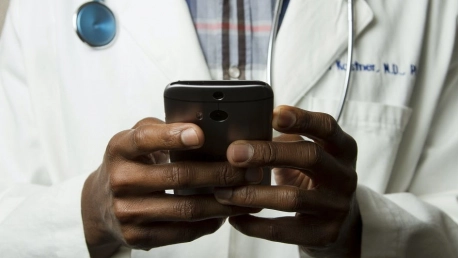The telecommunications industry is rapidly heading towards a new revolution as 5G technologies start to emerge. One ecosystem that could benefit from 5G is healthcare. IT services and applications in the healthcare landscape are expected to become more connected than ever before as 5G technologies start to make their way into healthcare delivery.
This article highlights three key use cases for 5G in healthcare and outlines how smart healthcare can be empowered by this emerging technology.
Telehealth
The telehealth market is expected to grow at an annual rate of 16.5% from 2017-2023, according to a study by Market Research Future. This growth is partially due to the emergence of faster network speeds enabled by 5G. It is believed that the quality of healthcare will increase as medical providers will engage more efficiently with patients on a remote basis without disconnections or lag time.
In the midst of a worldwide pandemic, 5G technologies enable better remote support for patients that need to minimize in-person visits to healthcare facilities to avoid exposure to the virus. Thanks to advanced 5G-enabled systems, patients experience a more natural virtual meeting with their care provider, helping them feel safer and more comfortable.
In fact, a recent survey reveals that 70% of patients are willing to see a doctor via video conference for non-urgent appointments and 70% are receptive to using toilet sensors, prescription bottle sensors, or swallowed health monitors.
Real-Time Remote Monitoring
5G-enabled wearables are a game-changer for healthcare providers that want to monitor their patients remotely and enable preventative care with the help of real-time information.
86% of doctors and 65% of consumers believe that wearable devices allow them to be more connected and engaged with their health. Not only is this good news for users, but also for healthcare providers—hospitals expect to cut down costs by 16% over the upcoming five years as 5G-enabled devices improve healthcare delivery.
The health internet of things is particularly useful for patients with chronic conditions who need autonomy over their illnesses. They need access to an always-on, mobile emergency response system and 5G technologies can make this happen. However, experts say that while remote technology is a revolutionary tool for improving the telehealth experience, it also has some limits. For example, a slow network connection can cause doctors to be unable to meet the patients’ needs and provide proper healthcare. That’s why 5G may be a key enabler of telehealth practices done right.
Large data files
It’s no secret that the healthcare industry produces and handles large amounts of data. Managing and sharing this data can be quite challenging in the current IT environment. With the help of high-speed 5G technologies, members of the healthcare ecosystem can overcome these issues.
“Adding a high-speed 5G network to existing architectures can help quickly and reliably transport huge data files of medical imagery, which can improve both access to care and the quality of care. At the Austin Cancer Center, the PET scanner generates extremely large files — up to 1 gigabyte of information per patient per study.”
– AT&T Business Editorial Team
“To get that much data from one side of the town to another, you’ve got to have the network performance to handle it,” confirmed Jason Lindgren, CIO of Austin Cancer Center. “We used to have to send the files after hours. Now as soon as the patient leaves the scanner, the study is already on its way. It’s beneficial to doctors because they can get the results that they need quicker.”
As the switch to 5G starts happening, more healthcare providers see it as a reliable long-term solution to the constantly rising demand for bandwidth. Keeping pace with the fast-changing medical landscape requires more than wired networks, it requires revolutionary technology.
Wrapping Up
The path to 5G in healthcare is shaped by future-oriented technological developments that promise to support the medical system in an unprecedented way. 5G seems to fit perfectly in the complex healthcare ecosystem, with multiple use cases that facilitate medical delivery and transform the patient experience. We have yet to discover how this modern technology will change the way we interact with healthcare.









